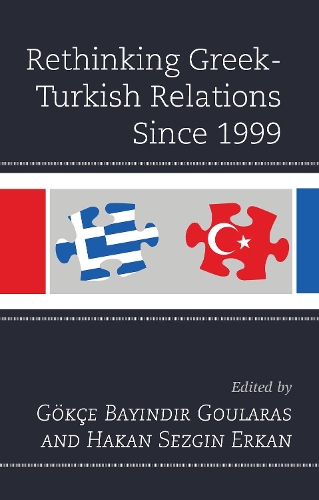
Rethinking Greek-Turkish Relations Since 1999
(Hardback)
Publishing Details
Rethinking Greek-Turkish Relations Since 1999
By (Author) Gke Bayindir Goularas
Edited by Hakan Sezgin Erkan
Contributions by Gke Bayindir Goularas
Contributions by Leonidas Karakatsanis
Contributions by Natalya Ketenci
Contributions by agri Levent Uslu
Contributions by Hercules Millas
Contributions by Hakan Sezgin Erkan
Contributions by Haris Theodorelis-Rigas
Contributions by Konstantinos Tsitselikis
Bloomsbury Publishing PLC
Lexington Books
16th October 2017
United States
Classifications
Professional and Scholarly
Non Fiction
Regional / International studies
International relations
327.4950561
Physical Properties
Hardback
144
Width 159mm, Height 240mm, Spine 17mm
399g
Description
GreekTurkish relations, despite some dtente periods in their shared history, have been generally characterized by hostility and antagonism. But a significantbreakthroughin GreekTurkish relations wasachievedin 1999, although certain signs of rapprochement were already present in the pre-1999 period. This date initiated a new era between the two countries thanks to a series of important events, such as the Helsinki summit, the earthquakes that occurred in 1999 in Turkey and in Greece, and the common initiatives of the Greek and Turkish Ministers of Foreign Affairs. Since then, bilateral relations have changed direction toward the positive. In order to better understand contemporary GreekTurkish relations, this book covers a number of different aspects including the current state of minorities, the development of the contemporary Turkish national discourse, the narratives of friendship between the two nations, the influence of electronic media for the reconciliation process, and the role of civil actors for changing the perception of the other. In a period where Greece is struggling to overcome its chronic financial problems and Turkey is being shaped by major political events, the relations between the two countries become highly important, especially in addition to their geographical position near a destabilized geopolitical region. This book is addressed to anyone who is interested in understanding the relations between Greece and Turkey today and in forecasting their future relationsand, by consequence, the future of the eastern Mediterranean area.
Reviews
This overview of civil society and grassroots exchanges and initiatives is a major contribution in overcoming the dominant stereotypes about two identities perceived as separate and inherently antagonistic. Essential reading for all interested in penetrating behind the surface of the Greek-Turkish relationship during a period of geopolitical recompositions in the former Eastern Question region. -- Georges Prevelakis, Sorbonne University
From Neo-Ottomanism, minorities, and the Patriarchate to cyberspace, civic dialogue, and civil initiative, this book approaches recent Turkish-Greek relations with a multidisciplinary perspective and shifts the helm to nongovernmental parts of the relations. -- Elin Macar, Yildiz Technical University
Author Bio
Gke Bayndr Goularas is assistant professor of political science and international relations in the French department at Yeditepe University. Hakan Sezgin Erkan is assistant professor of political science and international relations at Yeditepe University
